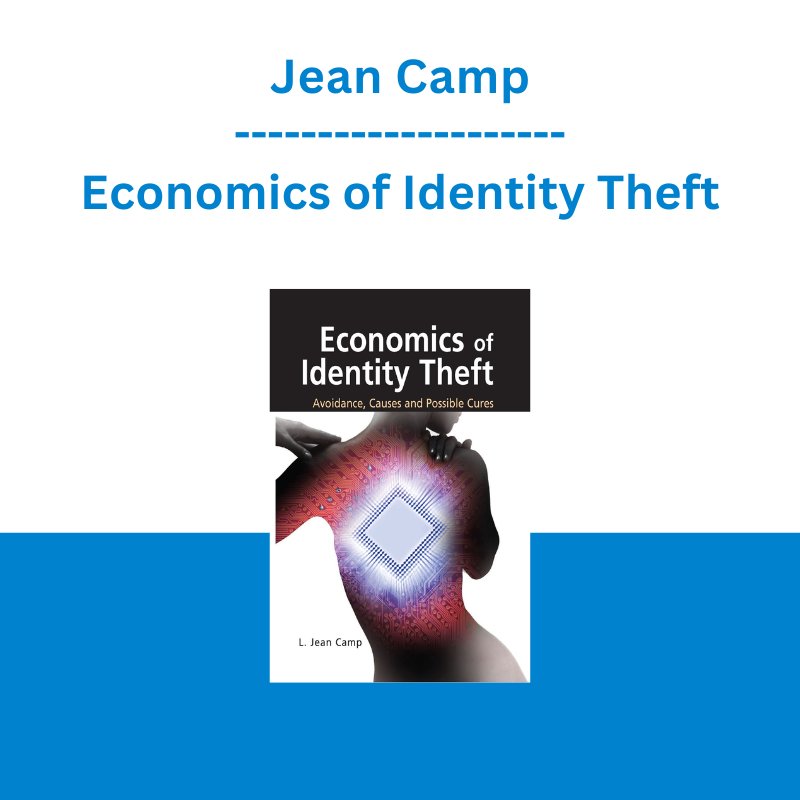*** Proof of Product ***
Exploring the Essential Features of “Jean Camp – Economics of Identity Theft”
Economics of Identity Theft
Avoidance, Causes and Possible Cures
Authors:
L. Jean Camp
While a plethora of books on identity theft exists, this book combines both technical and economic, presented from the perspective of the identified individual
Includes the method “Identity Papers” – the technology that underlies assumptions in many digital systems
Table of contents (18 chapters)
Front Matter
Pages I-XV
Identity in Economics, and in Context
L. Jean Camp
Pages 1-4
Modern Technological and Traditional Social Identities
L. Jean Camp
Pages 5-16
Identity Theft
L. Jean Camp
Pages 17-32
Who Owns You?
L. Jean Camp
Pages 33-48
Defeating the Greatest Masquerade
L. Jean Camp
Pages 49-59
Secrecy, Privacy, Identity
L. Jean Camp
Pages 61-72
Security and Privacy as Market Failures
L. Jean Camp
Pages 73-81
Trusting Code and Trusting Hardware
Bennet Yee
Pages 83-85
Technologies of Identity
L. Jean Camp
Pages 87-89
Anonymous Identifiers
L. Jean Camp
Pages 91-99
Digital Signatures
L. Jean Camp
Pages 101-108
Strengths and Weaknesses of Biometrics
Elaine M. Newton
Pages 109-124
Reputation
L. Jean Camp
Pages 125-140
Scenario I: Your Credentials Please
Paul Syverson
Pages 141-147
Scenario II: Universal National Identifier
Allan Friedman
Pages 149-159
Scenario III: Sets of attributes
Barbara Fax
Pages 161-163
Scenario IV: Ubiquitous Identity Theft
Ari Schwatz
Pages 165-172
Closing
L. Jean Camp
Pages 173-174
Back Matter
Pages 175-181
About this book
Anyone who has ever bought a car, rented an apartment, had a job or conversation that they would rather not see in their employee review may find this book of interest. There is a collision occurring in identity management. Identity technologies are problematic, and many see light at the end of the identity theft tunnel. Yet the innovation is driven by individual tendencies to seek convenience and business imperatives to minimize risk with maximized profit. The light is an oncoming identity train wreck of maximum individual exposure, social risk and minimal privacy. The primary debate over identity technologies is happening on the issue of centralization. RealID is effectively a centralized standard with a slightly distributed back-end (e.g., fifty servers). RealID is a national ID card. Many mechanisms for federated identities, such as OpenID or the Liberty Alliance, imagine a network of identifiers shared on an as-needed or ad-hoc process. These systems accept the limits of human information processing, and thus use models that work on paper. Using models that work on paper results in systematic risk of identity theft in this information economy. There are alternatives to erosions of privacy and increasing fraud. There is an ideal where individuals have multiple devices, including computers, smart cards, and cell phones. Smart cards are credit card devices that are cryptographically secure. This may be shared and misused, or secure and privacy enhancing. Yet such a system requires coordinated investment.
Reviews
From the reviews: “This book is primarily concerned with the interplay between identity management technologies and their associated economic impact. … Overall, this book provides an interesting oversight of the economics of privacy and an overview of a range of identity management technologies in an economic context. … It is certainly worthy of perusal, provided that its significant US bias and inconsistency in what is actually meant by ‘identity theft’ are recognised from the outset.” (Stefan Fafinski, Journal of Information, Communication & Ethics in Society, Vol. 7 (4), 2009)
Please see the full list of alternative group-buy courses available here: https://lunacourse.com/shop/









